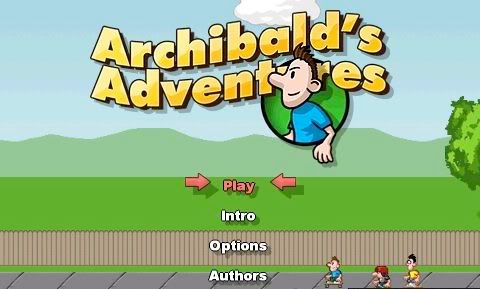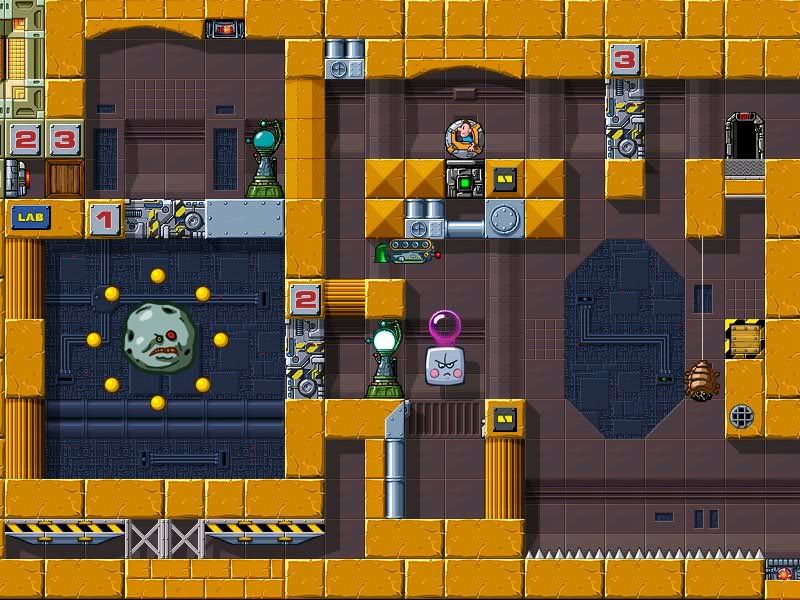Hey everybody,
Today I've decided to review Archibald's Adventures for the PSN (PS3).

Before we begin:
Synopsis/Key Features:
- 191 levels of varying puzzle difficulty.
- Various unique tools and machines to keep gameplay fresh and non-tedious.
Question: What do you get when you cross a rogue skateboarding kid, and a mad professor's laboratory full of crazy inventions? Answer: A rogue skateboarding kid in a mad professor's laboratory full of crazy inventions.Sorry. I know that joke and intro sucked. Actually, the real answer is you wind up with a refreshing gameplay experience seldom seen in games, specifically "PSP Minis" which often retail for a fraction of a cost of a full game, but come at a price: they usually suck. Archibald's Adventures retails for a measly $3.99, and you're definitely getting bang for your buck with this game.
What's Archibald's Adventures about? Well, the storyline (portrayed all in a very short comic book at the beginning of the game) informs us you're a skateboarding kid who while skateboarding near the professors mansion, accidentally falls down a nearby pipe and into his strange lab. The professor's lab is full of dangerous monsters, all with unique traits and movements, who all seem to want to kill Archibald. On his way in solving all the mysteries the professor's lab and mansion presents, Archie finds help from several of the professor's inventions. The actual story itself is far from interesting, in fact, it isn't interesting in the slightest bit, but the storyline doesn't matter because the core gameplay that follows in Archibald's Adventures more than makes up for it.
The basic premise of Archibald's Adventures is a pretty simple concept to swallow: open the exit door in each level, and exit the door to successfully complete it. What makes this puzzle game so unique is it never really feels like it's "repeating" itself. All the levels (a whoppin' 191 in total) are broken up into various small chapters (12 stages, and 2 bonus stages each for the most part). For example: the beginning two chapters are basically served as a tutorial, you'll control Archibald on his skateboard and learn all about the basic game mechanics (such as running and jumping) and dangers. In the third chapter you'll be introduced to the "Lode Runner' which is a machine that can break some small crates, climb walls, and stick to magnetic surfaces. Archibald will also be introduced to the professor's "artificial intelligence matter" (a pink bubble you can control) which can lift up crates, boxes, bombs and other objects, or be used to strategically open switches. In the next chapter he'll be introduced to the professor's flying machine that requires a lot of precision to operate. It's the ingenious blending of all these little inventions which make the levels so original, because they'll all be introduced gradually, and all be needed later on (with some wits) to solve the puzzles.
The puzzles themselves are refreshing and a wonderful mix of varying difficulty. The levels seem to fall into a few categories: "basic-to-intermediate wit required", "mind-bendingly difficult", and "OH DEAR GOD STOP KILLING ME." It's again the ingenious blending of all three categories that make the game very enjoyable and non-repetitive. Almost all the levels contain a "checkpoint pod" which allows you to infinitely continue from if you die (and you will, as if Archibald is hit by anything "dangerous" he'll die in a hit and be reverted back to the last pod activated) trying to solve the puzzle contained in the level. Most of the levels fall into that "basic-to-intermediate wit required" category, but there are a few real brain-busters scattered within the 191 levels offered.

The graphics are simplistic and definitely serve their purpose. I actually think in this case the colorful cartoonish/retro 90's graphics help solidify the gameplay and aesthetic appeal of the game. It's very easy to see everything in detail on the screen, and because it's presented in full view it's also very easy to strategically think about what you're facing because of it. 3D graphics or anything over the top would have probably ruined what the cartoon visuals help provide to the experience and gameplay.
The sound and music are both fairly mediocre. There's obviously songs in the background that loop indefinitely, but none of them are really memorable. I suppose the upside is none of the songs are particularly atrocious either. They serve as ambiance, and never really get in the way. It's all you can really ask for when it comes to synthesized music!
Controls are an upside and something the developers hit dead-on. They're very simplistic, and mostly explained in the first few chapters. I honestly don't have any complaints at all about the controls as they're very friendly and simple to new players. The falling physics take a little while to get used to (eg: where you'll rebound off walls and wind up after falling down a narrow passage, specifically onto one lone tile before falling to your death had you missed it) but once you do it a few times it'll become embedded in your memory and become almost second nature. RakeInGrass (the developer) also added a map feature which allows you to scan the levels before solving them (square button) at any given time, which is obviously a handy feature.
Overall, Archibald's Adventures is a great standalone game (something you could play for a while on-end) and a great game you can routinely pick-up-and-play after playing a retail release. It's very well polished, and all the puzzles have a wonderful mix of varying difficulty. It's probably to date one of the best, if not best PSP/PS3 Minis available on the PSN store and well worth the price-tag of $3.99. The only hindrance to Archibald's Adventures is the replayability, as like most puzzle games once you've successfully solved the puzzle there's no variance or change the next time you load up the level.
Graphics: 7.0/10.
Gameplay: 9.0/10.
Sound: 7.0/10.
Controls: 9.0/10.
Replayability: 4.0/10.
Overall: 7.2/10.
Today I've decided to review Archibald's Adventures for the PSN (PS3).

Before we begin:
Synopsis/Key Features:
- 191 levels of varying puzzle difficulty.
- Various unique tools and machines to keep gameplay fresh and non-tedious.
Question: What do you get when you cross a rogue skateboarding kid, and a mad professor's laboratory full of crazy inventions? Answer: A rogue skateboarding kid in a mad professor's laboratory full of crazy inventions.
What's Archibald's Adventures about? Well, the storyline (portrayed all in a very short comic book at the beginning of the game) informs us you're a skateboarding kid who while skateboarding near the professors mansion, accidentally falls down a nearby pipe and into his strange lab. The professor's lab is full of dangerous monsters, all with unique traits and movements, who all seem to want to kill Archibald. On his way in solving all the mysteries the professor's lab and mansion presents, Archie finds help from several of the professor's inventions. The actual story itself is far from interesting, in fact, it isn't interesting in the slightest bit, but the storyline doesn't matter because the core gameplay that follows in Archibald's Adventures more than makes up for it.
The basic premise of Archibald's Adventures is a pretty simple concept to swallow: open the exit door in each level, and exit the door to successfully complete it. What makes this puzzle game so unique is it never really feels like it's "repeating" itself. All the levels (a whoppin' 191 in total) are broken up into various small chapters (12 stages, and 2 bonus stages each for the most part). For example: the beginning two chapters are basically served as a tutorial, you'll control Archibald on his skateboard and learn all about the basic game mechanics (such as running and jumping) and dangers. In the third chapter you'll be introduced to the "Lode Runner' which is a machine that can break some small crates, climb walls, and stick to magnetic surfaces. Archibald will also be introduced to the professor's "artificial intelligence matter" (a pink bubble you can control) which can lift up crates, boxes, bombs and other objects, or be used to strategically open switches. In the next chapter he'll be introduced to the professor's flying machine that requires a lot of precision to operate. It's the ingenious blending of all these little inventions which make the levels so original, because they'll all be introduced gradually, and all be needed later on (with some wits) to solve the puzzles.
The puzzles themselves are refreshing and a wonderful mix of varying difficulty. The levels seem to fall into a few categories: "basic-to-intermediate wit required", "mind-bendingly difficult", and "OH DEAR GOD STOP KILLING ME." It's again the ingenious blending of all three categories that make the game very enjoyable and non-repetitive. Almost all the levels contain a "checkpoint pod" which allows you to infinitely continue from if you die (and you will, as if Archibald is hit by anything "dangerous" he'll die in a hit and be reverted back to the last pod activated) trying to solve the puzzle contained in the level. Most of the levels fall into that "basic-to-intermediate wit required" category, but there are a few real brain-busters scattered within the 191 levels offered.

The graphics are simplistic and definitely serve their purpose. I actually think in this case the colorful cartoonish/retro 90's graphics help solidify the gameplay and aesthetic appeal of the game. It's very easy to see everything in detail on the screen, and because it's presented in full view it's also very easy to strategically think about what you're facing because of it. 3D graphics or anything over the top would have probably ruined what the cartoon visuals help provide to the experience and gameplay.
The sound and music are both fairly mediocre. There's obviously songs in the background that loop indefinitely, but none of them are really memorable. I suppose the upside is none of the songs are particularly atrocious either. They serve as ambiance, and never really get in the way. It's all you can really ask for when it comes to synthesized music!
Controls are an upside and something the developers hit dead-on. They're very simplistic, and mostly explained in the first few chapters. I honestly don't have any complaints at all about the controls as they're very friendly and simple to new players. The falling physics take a little while to get used to (eg: where you'll rebound off walls and wind up after falling down a narrow passage, specifically onto one lone tile before falling to your death had you missed it) but once you do it a few times it'll become embedded in your memory and become almost second nature. RakeInGrass (the developer) also added a map feature which allows you to scan the levels before solving them (square button) at any given time, which is obviously a handy feature.
Overall, Archibald's Adventures is a great standalone game (something you could play for a while on-end) and a great game you can routinely pick-up-and-play after playing a retail release. It's very well polished, and all the puzzles have a wonderful mix of varying difficulty. It's probably to date one of the best, if not best PSP/PS3 Minis available on the PSN store and well worth the price-tag of $3.99. The only hindrance to Archibald's Adventures is the replayability, as like most puzzle games once you've successfully solved the puzzle there's no variance or change the next time you load up the level.
Graphics: 7.0/10.
Gameplay: 9.0/10.
Sound: 7.0/10.
Controls: 9.0/10.
Replayability: 4.0/10.
Overall: 7.2/10.
Comments
Post a Comment